Read everything about Low Libido and reclaim your sexual health.
What is Low Libido?
Low libido, often referred to as a reduced interest in sexual activity, can affect people of all genders and ages.
It's a common concern that can be distressing for those experiencing it. Low libido can affect men in various ways, leading to emotional and psychological distress.
Common Causes of Low Libido
Psychological Factors of Low Libido
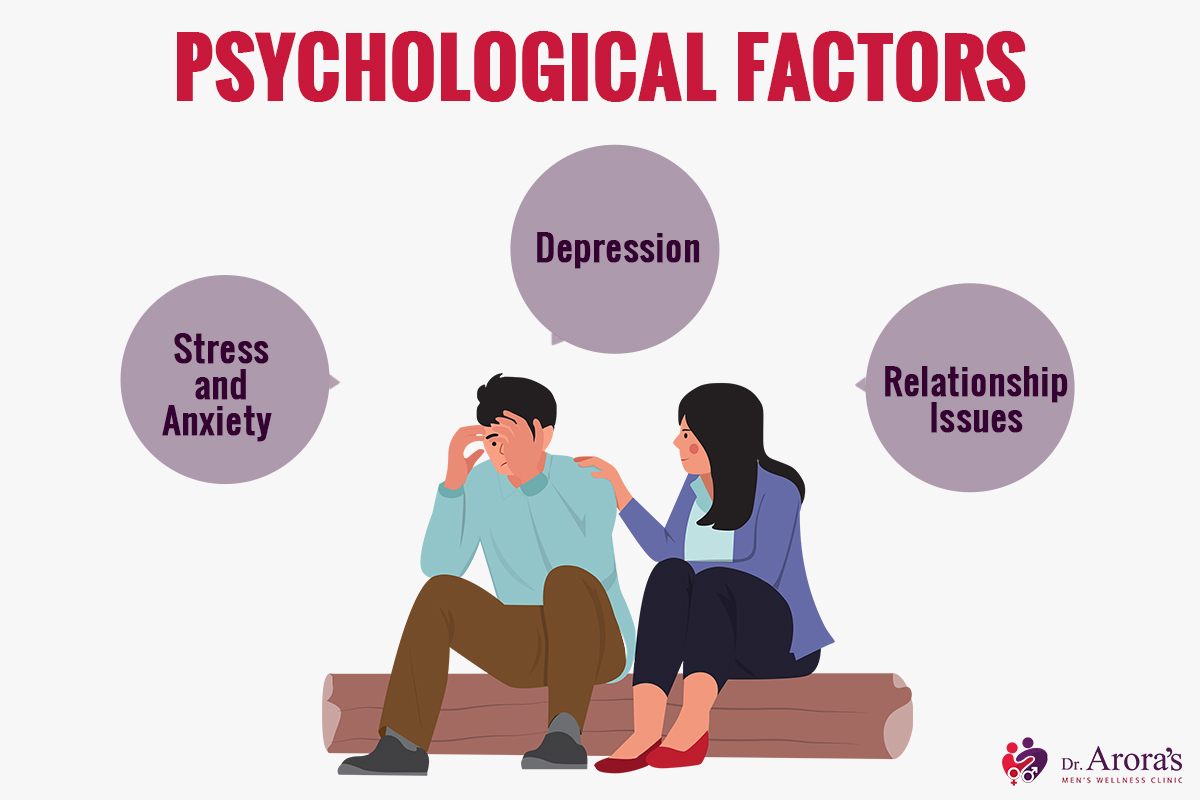
Physical Factors of Low Libido
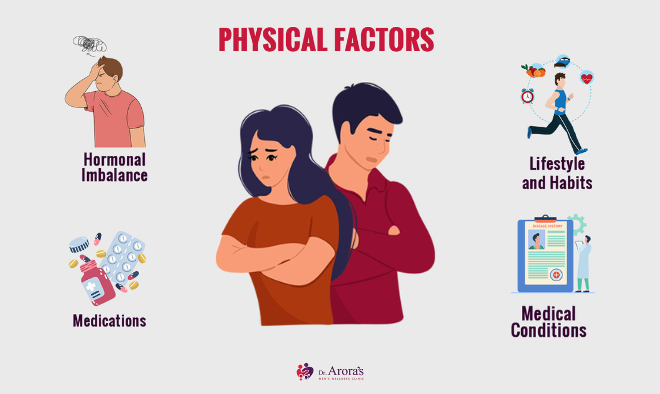
Common Causes of Low Libido
Decreased libido could happen due to a wide range of reasons including:

Psychological Factors of Low Libido
Physical Factors of Low Libido

Signs and Symptoms of Low libido
Low libido in men can manifest through various signs and symptoms, affecting both physical and emotional well-being. It's important to recognize these indications. The low libido symptoms include
Physical Signs and Symptoms of low libido :
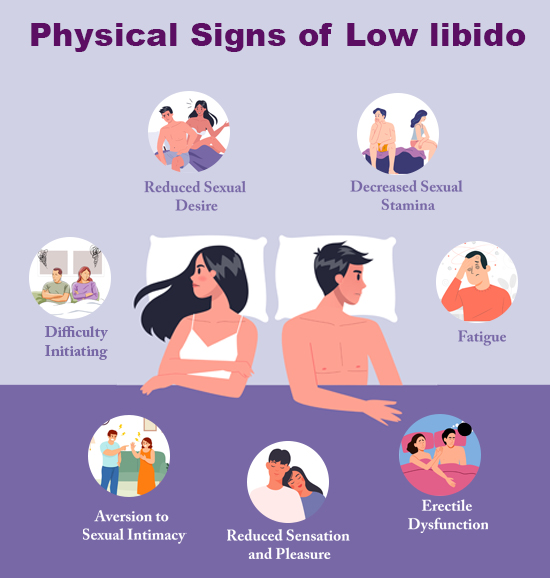
Emotional Signs and Symptoms of Low Libido :
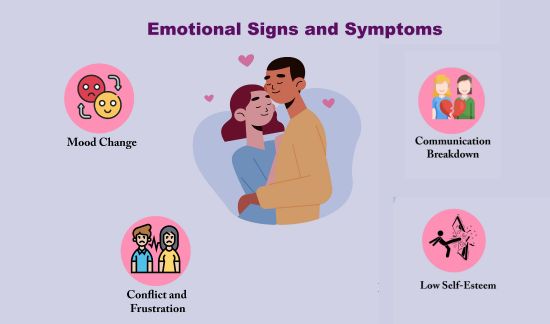
Signs and Symptoms of Low libido
Low libido in men can manifest through various signs and symptoms, affecting both physical and emotional well-being. It's important to recognize these indications. The low libido symptoms include:

Physical Signs and Symptoms of Low Libido :
Emotional Signs and Symptoms of Low Libido:

Diagnosis and Evaluation of low libido
Our first motive is to understand the reason behind low libido. Our best sexologists will conduct a thorough assessment to identify the underlying causes of low libido, considering both psychological and physical factors. Our team conducts a detailed checkup to find out the exact root cause. This assessment includes physical check ups and mental health evaluation. Your doctor can ask you questions like these to get a clearer idea about the current stare of your health.

Our team conducts a detailed checkup to find out the exact root cause. This assessment includes physical check ups and mental health evaluation.
Please be transparent with your sexologist and help them guide you towards a better sex life. A detailed evaluation is crucial for developing an effective treatment plan. Once the sexologist unveils the root cause, they can create a tailored treatment plan to help you conquer low sex drive.
Low libido vs Low Testosterone Level
Low libido and low testosterone are two distinct but often interconnected issues that can affect men's sexual health.
Understanding the differences between them is essential for accurate diagnosis and effective treatment. Here is how these two conditions differ:
Low Libido:
Low Testosterone (Hypogonadism):
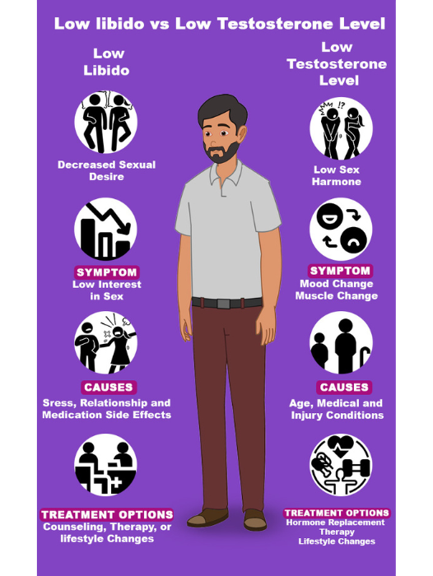
Treatment Options

Medications
In some cases, medications may be prescribed to address hormonal imbalances or other issues to boost libido.

Hormone Therapy
If hormonal imbalances are contributing to your low libido, we can help rebalance your hormones.

Therapy and Counseling
Sexual therapy and counseling can address psychological factors contributing to male low libido, offering strategies for improvement.

Lifestyle Changes
Adjusting one's lifestyle and habits, such as improving diet and exercise, can act as libido enhancers.

Prevention and Self-Care
Preventing low libido involves maintaining a healthy lifestyle, open communication in relationships, and stress management. Self-care is essential for sexual well-being.

Building Healthy Relationships
Cultivating healthy relationships through effective communication and mutual understanding is essential for a fulfilling sexual life.
From Sizzle to Silence : The Emotional Toll of Low Libido on Love
Featured In






Discovering Solutions: Your Sexual Health Questions Addressed in Our YouTube Videos – Check It Out Now!
Frequently Asked Questions To The Sexologist
In the case of low libido levels, the first thing you would need to do is to check for any underlying health conditions. The sexologist will help you find the exact reason which can be either physical or psychological.
Before we can assure you that we can restore the libido levels, we will first understand the root cause of the problem. Based on our understanding, we will suggest various kinds of lifestyle changes like your diet, reducing your stress levels, quitting or reducing alcohol, smoking, or any other such addiction. Our specialist may also recommend some medicines or change your present prescription or treatment depending on the updated test results.
Testosterone is the hormone that affects sexual arousal and desire. Our sexologist will help in the evaluation of hormone levels and suggest if you are a good candidate for hormone therapy.
Doctors recommend a diet that includes legumes, whole grains, vegetables, and fruits that will improve blood flow in the body, including the penis. A good blood flow to the penis is the key to consistent and healthy erections. A proper diet is one of the critical factors while undergoing a Loss of Libido Treatment.
Yes, low libido can affect individuals of all genders.
The time it takes to see improvements varies from person to person, but consistent therapy can lead to positive changes.
Yes, certain lifestyle changes, like diet and exercise, can naturally boost libido. Moreover, we at Dr Arora Men's Clinic prescribe 100% herbal supplements while working on the root cause of the main issue.
During a consultation, a sexologist will assess your concerns, discuss your sexual history, and work with you to develop a tailored treatment plan
No, low libido can stem from both physical and psychological factors, and it's essential to consider both aspects when seeking help
Tedx Speaker
Dr. Deepak Arora, top sexologist in India, talks about the challenges of facing premature ejaculation on his first night after marriage. A struggle that once left him feeling depressed and even contemplating suicide.
Dr Arora's story serves as a beacon of hope for those dealing with similar issues, as he talks openly about his journey from being clueless to understanding how he can overcome the battle.
Having walked in your shoes and experienced the devastating impact firsthand, he is tirelessly committed to improving your sexual well-being with the knowledge he acquired over years.
Top Notch Treatment
Get yourself treated under the supervision of India's first Sexologist who Studied at The University of Michigan, USA. Our medicines are 100% Safe with no side effects.
India's First Online Sexual Health Consultation Clinic.
Top Notch Treatment
Get yourself treated under the supervision of India's first Sexologist who Studied at The University of Michigan, USA. Our medicines are 100% Safe with no side effects.
India's First Online Sexual Health Consultation Clinic.
365 X 7 Support
Our Patient Care Team is Available to Assist you 365 days a year. Their Sole Motto is to give you the proper guidance and help you get the most out of the Consultation.
Call 93577-38797 to reach us.
10:00 am to 07:00 pm


